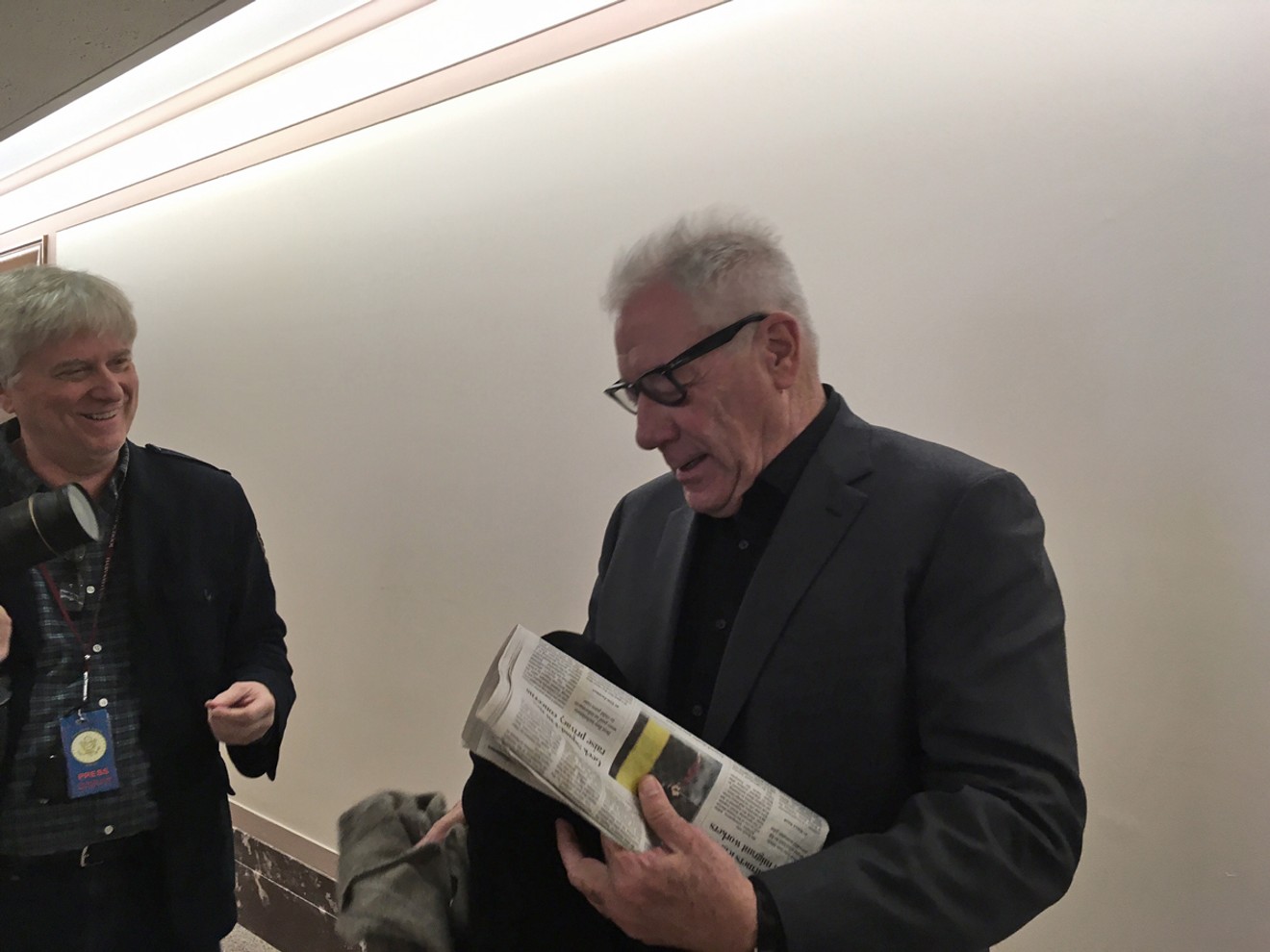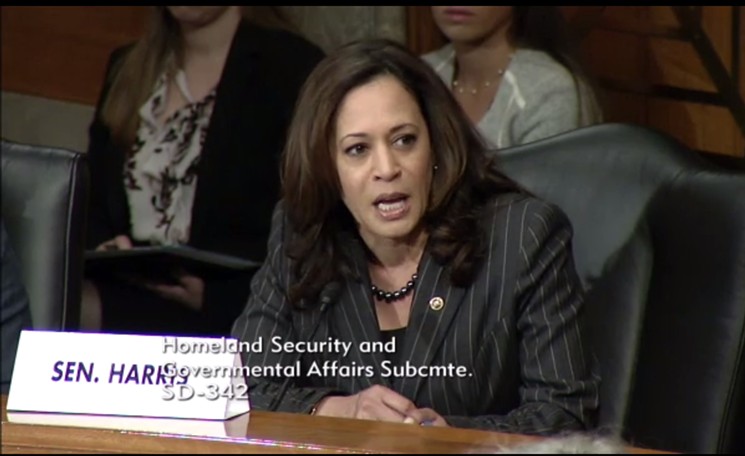Five current and former executives of the online classified-advertising behemoth Backpage.com invoked their rights under the First and Fifth amendments to the U.S. Constitution this morning before a U.S. Senate panel investigating child sex trafficking.
Again and again, Backpage CEO Carl Ferrer, Chief Operations Officer Andrew Padilla, former owners Michael Lacey and Jim Larkin, and the company's general counsel Elizabeth McDougall declined to answer questions from members of the Senate's Permanent Subcommittee on Investigations about Backpage's business practices, on the grounds that they were not obligated to testify, and that any responses might later be used against them in a court of law.
That last threat is by no means an idle one. Lacey, Larkin, and Ferrer are facing criminal charges in California, brought by that state's former attorney general, freshman U.S. Senator Kamala Harris. Though Harris is not a member of the subcommittee and did not participate in the questioning of the witnesses, she delivered opening remarks, sounding at all times like the prosecutor who is going back for a second shot at the three men after her first salvo of pimping charges were thrown out by a Sacramento judge in early December. Shortly before her term as attorney general expired, Harris refiled the pimping charges and tacked on 27 counts of money laundering.
"To be clear, this is a crime," Harris said of Backpage's actions in running its adult section. "It is a crime that is rightly punishable by incarceration in prison, because of the nature of the harm to the victims, and the outrageousness of the conduct that is predatory in nature."
Harris' view was shared by her colleagues on the dais, who made made clear their disgust in the title, of both the hearing and a blistering 50-page report, "Backpage.com's Knowing Facilitation of Online Sex Trafficking," which alleges that Backpage scrubbed certain words — such as "Lolita," "teen," and "Amber Alert" — from adult ads placed by third parties on the site, because those words might be associated with child sex trafficking.
The report, issued the day before the hearing, preceded a bombshell move by Backpage, which last night closed its adult sections for cities throughout the United States, wherein advertisers offer everything from escort services and massages to foot worship and sadomasochism. Each heading in that section now is labeled "censored" in bold red type and offers links to statements by Backpage, and Lacey and Larkin, claiming the move was necessary owing to the heavy hand of government intrusion.
In his opening statement, Subcommittee Chairman Rob Portman, an Ohio Republican, rejected the notion that the ongoing battles over Backpage had anything to do with the First Amendment — yet Portman crowed about the news of the shuttering of the adult section, a move that mirrors an action taken by industry giant Craigslist.org in 2010.
"Backpage has not denied a word of these findings," Portman gloated. "Instead, several hours after the report was issued yesterday afternoon, the company announced the closure of its adult section, claiming 'censorship.' But that's not censorship. That's validation of our findings."
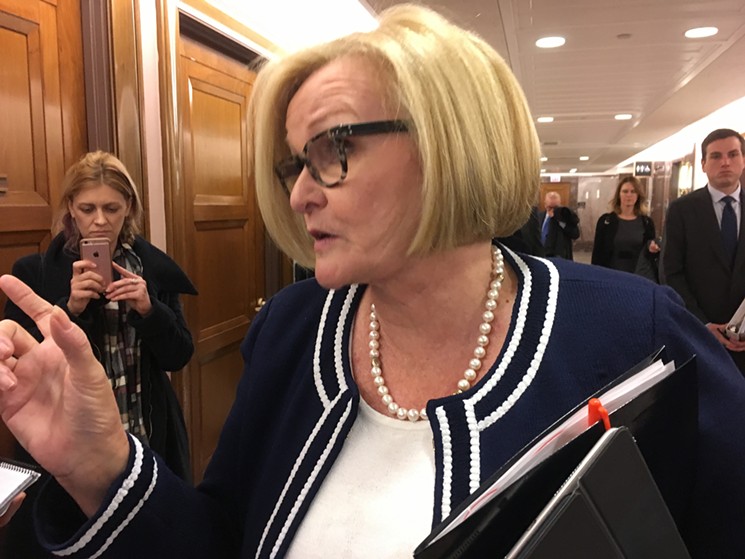
Missouri Senator Claire McCaskill, the ranking Democratic member of the Permanent Subcommittee on Investigations.
Stephen Lemons
The ranking Democrat on the subcommittee, Senator Claire McCaskill of Missouri, was similarly irony deficient at times, saying in her introductory speech that in holding Backpage in civil contempt of Congress last year for not obeying the subcommittee's subpoenas, the U.S. Senate had "recognized that our investigation into the market leader in selling sex online is a legitimate and important use of the subcommittee’s authority."
Of course, Backpage does not sell sex; it sells online adult ads. McCaskill later alleged that children are being sold into sex slavery via Backpage — another seemingly deliberate conflation of sex between consenting adults, prostitution, and child sex trafficking that persisted throughout the hearing.
At one point, McCaskill called Backpage's advertising practices "the definition of evil."
Republican Senator Steve Daines of Montana took a lofty but no less hyperbolic tack, invoking as inspiration for the subcommittee the name of 18th-century English abolitionist William Wilberforce and the hymn Amazing Grace, which was written by a former slave trader.
After the witnesses were sworn in, Portman wryly advised them that they were free to invoke the Fifth Amendment and warned that if they responded to any of the questions put to them instead of reiterating their right to avoid self-incrimination, the subcommittee would consider that right waived.
At one point Portman attempted to get Ferrer to read a word from a list of terms that are forbidden in Backpage ads.
Ferrer replied as all of the witnesses did, with little variation:
"After consulting with counsel, I decline to answer your question based on the rights provided by the First and Fifth amendments."
As each witness in turn recited this litany over and over, Lacey often gazed toward the ceiling. His longtime business partner Larkin — with whom he founded the Phoenix New Times and co-owned the Village Voice Media (now Voice Media Group) chain before selling it in 2012 — added a subtle stroke of rebelliousness to the rote reading by emphasizing the words "First Amendment" as he spoke them.
Having absorbed their senate shellacking, the five witnesses were dismissed. In the corridor outside the hearing room, Lacey bantered briefly with reporters as he made his way to the elevator. When I asked his opinion on the hearing's purpose, given that the subcommittee was fully aware he and the others would invoke their right not to speak, he smiled.
"Shame. Public shaming," Lacey replied, adding, "What they don't know is that I'm beyond shame."
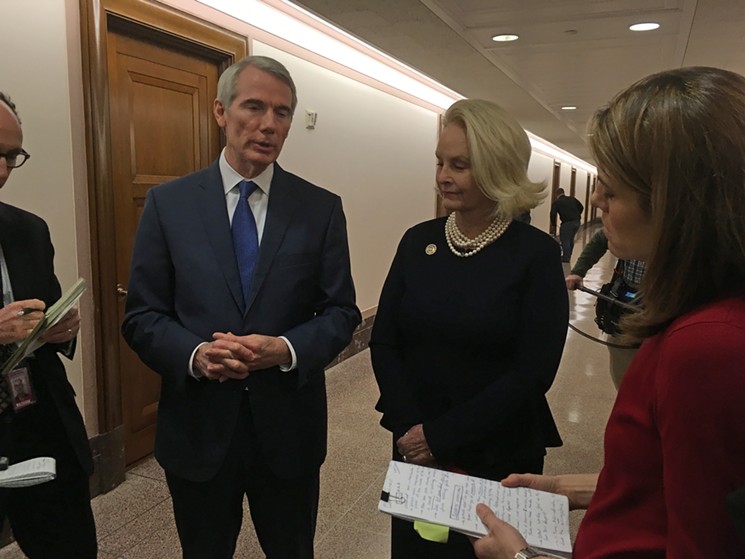
Republican senator Rob Portman of Ohio, chairman of the Permanent Subcommittee on Investigations (left), and anti-trafficking crusader Cindy McCain, whose husband, Arizona Senator John McCain, is a subcommittee member.
Stephen Lemons
In fact, just a few minutes prior, North Dakota Senator Heidi Heitkamp, a Democrat, practically wagged her finger at Lacey and the others, Church Lady-style, and inveighed, "Your company exploits children, children all across the country.... Shame on you for hiding behind the First Amendment while you exploit children in this country and destroy families."
Asked by another reporter how he felt the hearing went, Lacey sardonically remarked that it was better than the arraignment he'd attended in Sacramento, where he shared an inside-the-courtroom cage with Larkin and Ferrer, all three of them decked out in county-issued orange jumpsuits. He told one journalist that he no longer had anything to do with Backpage, though during the hearing, Portman accused him and Larkin of enjoying "significant control over the company," insisting that the two had sold their interest to Ferrer in 2014 by lending the tech entrepreneur $600 million.
After Lacey, Larkin, et al., left the room, the subcommittee heard from three parents of child-trafficking victims, who gave tearful testimony and blamed Backpage for selling ads that involved their children. In their view, the company execs are as bad as real-life pimps.
Portman closed the hearing by thanking the parents and expressing the opinion that he believed Backpage broke the law by stepping outside the boundaries prescribed by federal statute, specifically Section 230 of the 1996 U.S. Communications Decency Act, which grants immunity to publishers of interactive websites that host third-party content.
Federal and state courts alike have cited Section 230 in decisions favoring Backpage, and Silicon Valley has been watching Backpage's travails with guarded interest, fearful of any erosion of the protections they currently enjoy from liability for content that others post to their sites. Portman seemed to believe Backpage was an exception to this rule, and he said that he and McCaskill would discuss referring the matter to the U.S. Department of Justice and state attorneys general across the country.
After the hearing, as she spoke with reporters in the hall, McCaskill gave a perfect example of why tech companies and online startups should be concerned by politicians who want to make exceptions to Section 230. The Missouri senator declared that the subcommittee's report cited evidence that proved Backpage execs were aware the ads on their site were "selling children."
"How did they know that they involved children?" I asked.
"Because [the ads] said 'teen,' [they said] 'underage,'" she replied.
"There's pornography that says 'teens' that doesn't involve teens," I persisted.
"You want to take the position that what [Backpage] did was OK, then we have a fundamental disagreement," she said.
At the other end of the hall were Portman and Cindy McCain, who attended the hearing in her role as a member of the Human Trafficking Advisory Council to the McCain Institute for International Leadership, a D.C.–based think tank. McCain's husband, Arizona Senator John McCain, is a member of the Permanent Subcommittee on Investigations and delivered a brief, desultory address at the outset of the proceedings before leaving to attend to pressing affairs on the Armed Services Committee, which he chairs.
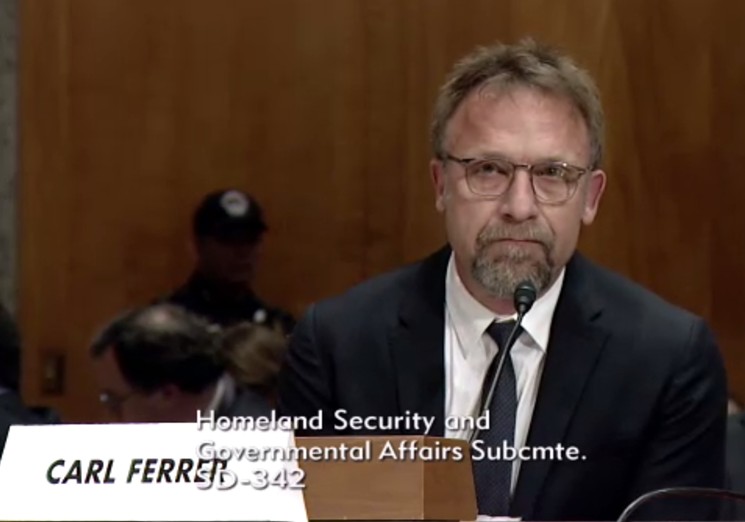
Like Lacey, Larkin, and the others, Backpage co-founder and CEO Carl Ferrer invoked his rights under the First and Fifth amendments.
Standing next to Portman, Cindy McCain effusively praised the PSI's work, thanking the chairman and calling Backpage "child abuse at its worst." She hailed the pulldown of Backpage's adult services section, telling reporters, "We're here for the children."
I asked McCain if she wanted to ban all adult advertising, at which point she made the same leap McCaskill had.
"This isn't adult — we're talking children," she said.
"How do you know they all involve children?" I asked, referring to Backpage's extensive adult listings, which include virtual reams of plainly legal conduct.
She said that studies have shown that they do involve children.
"They found that all of the ads involve minors?" I pressed.
"Give me a break," she exclaimed.
"That's why I'm asking if you want to get rid of all of the adult ads on Backpage," I said.
"Well, if Backpage had complied with suggestions that we had made with being able to prove [age and identity of advertisers] with driver's license, whatever—"
"Is that the law?" I asked.
"No," she conceded.
Obviously, that doesn't dovetail with Portman's assertion that he has demonstrated the guilt of Backpage and its current and former execs beyond a shadow of a doubt.
Perhaps his subcommittee scored a victory with Backpage's tactical retreat. But the subcommittee's version of a show trial calls to mind a dark time in the 1950s when the same august body was chaired by none other than Wisconsin Senator Joseph McCarthy, who made similarly dangerous assumptions regarding the guilt of private citizens — with ruinous results.

